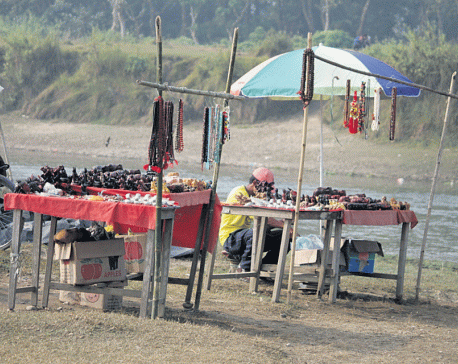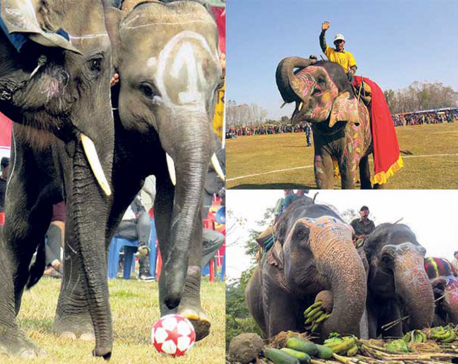
OR
In Chitwan, youth entrepreneurs are producing paper from elephant dung
Published On: August 19, 2019 08:00 AM NPT By: SUPRIYA SHARMA

KATHMANDU, Aug 19: Two youth entrepreneurs are producing paper from elephant dung for the first time in Sauraha, Chitwan. Keeping the proper elephant dung management and deforestation in case of producing paper in mind, they came up with the idea of producing paper out of elephant dung.
Result: paper is coming from elephant dung.
“We have sold approximately 4,600 sheets of papers so far”, said Sunny Rajopadhaya, the co-founder of Ecoorb Initiative, a small local business group working under the guidance of Nepal Communitere, a non-profit organization. “The papers we make from elephant dung are turned into gift cards, pens and pencils”, he added. “The 20 X 30 inches 200 grams paper is sold for Rs. 50.”
An elephant excretes 200 kg of dung on an average per day and there are more than 200 elephants domesticated in Sauraha, Chitwan, which is why proper waste management of elephant dung in Chitwan is a huge problem right now.
The waste is being burned because there has not been any alternative suggestion to use it.
Aimed at translating elephant dung management as an opportunity, Sunny Rajopadhaya and his friend Jonej Shakya (the co founders of Ecoorb Initiative) came up with the perfect solution to this problem with a few suggestions from the locals and a lot of online research, making paper out of Elephant dung some 10 months ago.
The elephant’s gastrointestinal tract cannot digest fibers well and thus its dung has the potential to form the pulp needed to make paper, this is an animal which digests only 40 per cent of what it eats.
“We currently have a small pop-up shop in Nepal Communitere, we also sell our products online”, said Sunny.
It takes around 4-5 days to produce paper from dung. It is a long process and everything is done manually. The first step is collection; the dung is collected from Sauraha, Chitwan, which is then it is soaked in water overnight and washed several times until only the grass fibers remain. The grass fiber is then boiled for 7 to 8 hours after which the pulp is ready. The pulp is then placed in a ‘Beater machine’ from which the cellulose is extracted which is then poured in a framed screen and placed upright in sunlight to let it dry naturally.
“We have created employment opportunity for 6 local women in Chitwan”, Sunny said.
The group is now looking for investors to increase the quantity of paper. “We produce and are also planning on buying a calender machine to improve the quality of the papers,” Sunny told Republica.
You May Like This

Coronavirus hits Chitwan tourism hard
CHITWAN, March 13: The widespread outbreak of coronavirus has affected the tourism sector in the country. Sauraha, the main tourist... Read More...

Animal rights activists urge Nepal to end elephant abuse
KATHMANDU, Jan 29: Fifty international experts on elephants have urged the government of Nepal to stop elephant abuse during the... Read More...

Elephant Safari launched in western Chitwan
CHITWAN, Dec 14: Four community forests located in Chitwan's western part have introduced elephant safari with an aim to boost... Read More...





Just In
- 286 new industries registered in Nepal in first nine months of current FY, attracting Rs 165 billion investment
- UML's National Convention Representatives Council meeting today
- Gandaki Province CM assigns ministerial portfolios to Hari Bahadur Chuman and Deepak Manange
- 352 climbers obtain permits to ascend Mount Everest this season
- 16 candidates shortlisted for CEO position at Nepal Tourism Board
- WB to take financial management lead for proposed Upper Arun Project
- Power supply to be affected in parts of Kathmandu Valley today as NEA expedites repair works
- Godepani welcomes over 31,000 foreign tourists in a year






_20220508065243.jpg)







Leave A Comment